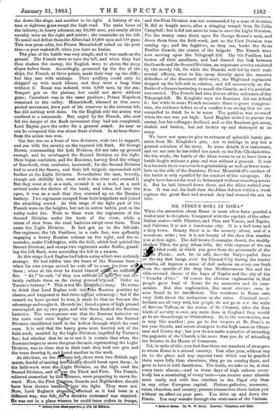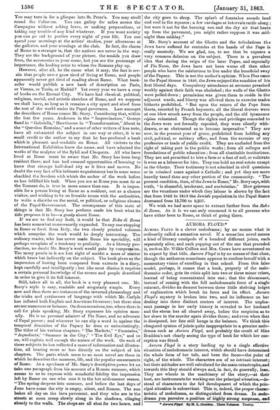MR. STORY'S ROBA DI ROMA.*
WHAT the attraction about Rome is must often have puzzled a visitor new to the place. Compared with the capitals of the other Italian states—with Florence, and Pisa, and Venice, and Naples, and Palermo, it is not a handsome city. It is a dull town and
a dirty town. Beauty there is in the scenery about, and of a wondrous order ; but it is not beauty of the class that startles you at first sight. The dull brown C.nnpagna desert, the muddy shallow Tiber, the grey Alban hills, the wide expanse of the sea -tiled roofs, at which you gaze from the promenade of the Pincio ; and, let us add, the—for Italy—pallid lines of the sky that hangs over the Eternal City during the winter ' months, all impress a sense of dull sadness on every one fresh rom the sparkle of the deep blue Mediterranean Sea and the villa-covered shores of the bays of Naples and the city of the " Concha d'Oro." Of course the obvious explanation is, that people grow fond of Rome for its memories and its cere- monies. But this explanation, like most obvious ones, is soon found to be insufficient. The residents in Rome care very little about the antiquities or the ruins. Classical recol- lections are all very well, but people do not go to see the walls of Servius Tullius, or the shrine of St. Clement, after the first blush of novelty is over, any more. than in England they would go to see Stonehenge or Glastonbury. As to the ceremonies, one is very like another ; you go to the vespers at St. Peter's to see your friends, and escort strangers to the high mass on Christ- mas and Easter day ; but you do not make a practice of attending the pageants of the Chureh a bit more than you do of attending the debates in the House of Commons.
Yet, in spite of this, you find that there are numbers of strangers
to whom Rome is a second country. Year after year, without any tie to the place and any especial taste which can be gratified there more fully than elsewhere, they go on coming there, and grow to love it with fanaticism. The truth, we take to be, is that every taste almost,—and in these days of high culture every- b ody has a smattering of every taste—can receive some aliment more easily and with less exertion in the Papal city than in any other European capital. Picture-galleries, museums, ruins, churches, and country, present themselves there before you without an effort on your part. You drive up and down the Pincio. You may wander through the staircases of the Vatican.
• Bobs di Boma. By W. W. Story. London: Chipman and Hal.
You may turn in for a glimpse into St. Peter's. You may stroll round the Coliseum. You can gallop for miles across the Campagna without asking leave, or making preparations, or taking any trouble of any kind whatever. If you want society you can go out to parties every night of your life. You can spend your mornings at the artists' studios, your afternoons at the galleries, and your evenings at the club. In fact, the charm of Rome to a stranger is, that the natives are never in the way. They are the background of your picture, the models you draw from, the accessories to your scene, but you are the personage of importance, the leading actor to whom the Romans play up.
However, after all, be the cause what it may, the fact is cer- ain that people never grow tired of living at Rome, and people apparently never get tired of reading about Rome. What book- seller would publish a new book of description on Paris, or Vienna, or Turin, or Madrid? Yet every year we have a crop of books on the Eternal City. We have had classical, political, religious, social, and artistic sketches of Rome, and we suppose we shall have, as long as it remains a city apart and aloof from the rest of the world under its Papal governors. Last amongst the describers of Rome comes Mr. Story. Considering that, within the last few years, Anderson in the " Impiovisatore," George Sand in " Gabriella," Hawthorne in "Transformation," About in the " Question Romaine," and a score of other writers of less note, have all exhausted the subject in one way or other, it is no small credit to the author to say that he has produced a book which is pleasant and readable on Rome. All visitors to the International Exhibition know the name, and have admired the works of the sculptor of the Sybil and Cleopatra. All who have lived at Rome must be aware that Mr. Story has been long resident there, and has had unusual opportunities of learning to know that strange half-dead city as it lives and moves. No doubt the very fact of his intimate acquaintance has in some sense shackled the freedom with which the author of the work before us has fulfilled his task. When you are at Rome you must do as the Romans do, is true in more senses than one. It is impos- sible for a person living at Rome as a resident, not as a chance visitor, and wishing to be on liveable terms with the authorities, to write a diatribe on the social, or political, or religious abuses of the Papal Government. The consequence of this state of things is that Mr. Story has perforce made his book what its title proposes it to be—a gossip about Rome.
If we are to find any fault, it would be that Roba di Roma has been somewhat unnecessarily expanded. To any one stopping in Rome or fresh from Italy, the two closely printed volumes which comprise the 'work would be deeply interesting. The ordinary reader, who has never made Rome his speciality, will perhaps complain of a tendency to prolixity. As a literary pro- duction, no doubt Mr. Story's work would gain by compression. The many pearls in it are lost sight of amidst a mass of Matter which bears but indirectly on the subject. The book gives us the impression of having been composed from extracts in a diary, kept carefully and intelligently ; but like most diaries it requires a certain personal knowledge of the scenes and people described in order to give it its full interest.
Still, taken all in all, the book is a very pleasant one. Mr. Story's style is easy, readable and singularly simple. Every now and then there are instances of the inverted phraseology and the tricks and pettinesses of language with which Mr. Carlyle has inflated both English and American literature; but these sins arenot numerous or heinous. On those occasions, too, where there is call for plain speaking, Mr. Story expresses his opinion man- ully. He is no personal admirer of Pio Noun, and no advocate of Papal power ; and wherever he can slip a word in against the temporal dominion of the Papacy he does so unhesitatingly. The titles of his various chapters, " The Markets," " Fountains," "Aqueducts," "Summer in the City," " The Evil Eye," and so on, will explain well enough the nature of the work. On each of these subjects he has collected a mass of information and illustra- tion, all bearing more or less directly on the subject of his chapters. The parts which seem to us most novel are those in which he describes the manners, life, and the popular amusements of Rome. As a specimen of Mr. Story's descriptive power let us take one paragraph from his account of a Roman summer, which seems to us to express with wonderful fidelity the impression left by Rome on one who sees it in the hot midsummer season. "The spring deepens into summer, and before the last days-of June have come the city is empty, silent, and Roman. The sun bakes all day on the lava pavement, and they who are in the streets at noon creep slowly along in the shadows, .clinging closely to the walls. The shops are all shut for two hours, and
the city goes to sleep. The splash of fountains sounds lend and cool in the squares; a few carriages at intervals rattle along ; but were it not for the burning sun and -the dry air that beats up from the pavement, you might rather suppose it was mid- night than midday."
Mr. Story's account of the Ghetto and the tribulations the Jews have suffered for centuries at the hands of the Pope is really masterly. We are glad, too, to see that he exposes a very common delusion on the subject. There is a prevalent idea that during the reign of the later Popes, and especially of Pio Nono, the Jews have not been worse off than other people who have the misfortune to live under the beneficial sway of the Papacy. This is not the author's opinion. When Pius came to the Papal throne in 1846, the Jews enjoyed the sunshine of his first liberal days. Compulsory attendance at sermons preached weekly against their faith was abolished ; the walls of the Ghetto were pulled down ; permission was given them to reside iu the adjacent wards, and liberty was allowed them to exercise trades hitherto prohibited. " But upon the return of the Pope from Gaeta, escorted by French bayonets, all the liberal decrees were at one blow struck away from the people, and the old tyrannous regime reinstated. Though the rights and privileges conceded to the Jews were not formally repealed, they were silently with- drawn, or so obstructed as to become inoperative." They are now, in the present year of grace, prohibited from holding any civil, political, or military office, and from the exercise of any profession or trade of public credit. They are excluded from the right of taking part in the public works ; from all colleges and foundations of public education ; from all charitable institutions. They are not permitted to hire a farm or a foot of soil, or cultivate it even as a labourer for hire. They can hold no real estate except iu the Ghetto. Their testimony is not admitted in civil questions or in criminal cases against a Catholic ; and yet they are more heavily taxed than any other portion of the community. " The present condition, then, of the Jews in Rome," Mr. Story says, with truth, " is shameful, intolerant, and unchristian." How grievous are the vexations under which they labour is shown by the fact that from 1842 to 1853 the Jewish population in the Papal States decreased from 12,700 to 9,237.
We wish we'had more space to extract further from the Roba di Roma. As it is we can only commend it to all persons who have either been to Rome, or think of. going there.































 Previous page
Previous page